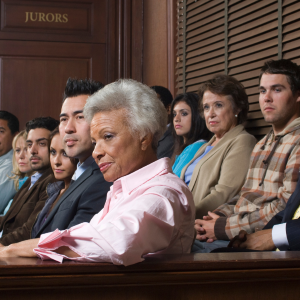Vicarious trauma and the Juror

Blog post by Martyn Fryer
A few years ago I served as foreperson of the jury in a lengthy trial at the Central Criminal Court or as is it usually known, The Old Bailey.
The Contempt of Court Act 1981 precludes me mentioning anything that was discussed or happened in the confines of the Jurors Room where our deliberations were carried out, however I am free to discuss the case itself – it is after all a matter of public record held in a public open court.
More recently, in fact a few weeks ago, as part of one of the current modules I am undertaking with the OU we had a session on vicarious trauma {VT}, not new to me as I’d had training on VT in my career as a firefighter, but it did get me thinking about my jury service.
The trial was lengthy, 4 months or so including deliberations. The case involved 23 counts (some historic) of sexual assault against 20 women ranging in age, at the time of the offences, from 12 to 50. All of these women were called to give evidence, one of whom was now in her 70s. As jurors we were hearing, examining, and reviewing evidence for this period that was graphic, harrowing, detailed, personal, explicit, dreadful, upsetting, distressing, excruciating and so many more adjectives that don’t come close to explaining what hearing the detail of 23 sexual assaults from 21 traumatised witnesses (the mother of the 12-year-old gave evidence) was really like.
As part of the induction process for new jurors, as well as getting your meal voucher and checking you are not disqualified, and a leaflet (more on that later), there is a 7 minute cartoon infovideo on what you can and can’t do and what to expect of your service, basically the Judge is the person sitting in a high chair, and the barristers wear wigs! Once selected and sat in court the Judge then explains in more detail what is expected of you, do’s and don’ts and explains how important the whole process is in upholding justice.
After it was all over we were thanked by the Judge, given a letter excusing us from Jury duty for 10 years due to the harrowing evidence we had heard over a lengthy period and sent on our way. You may remember I mentioned a leaflet, you can see it at https://assets.publishing.service.gov.uk/government/uploads/system/uploads/attachment_data/file/938496/j001-eng.pdf
The last paragraph states: When the trial is over, if you feel UPSET about anything to do with your case or if you just want to TALK about how you felt being a juror, HELP is available. Your GP can help you find free counselling services. You can also talk to the SAMARITANS any day at any time you like in your own way about whatever is bothering you, no matter how small it may be. You can call them for FREE on 116 123 or EMAIL at: [email protected]
This is all the help we were offered with regard to coping with what we had heard and seen. Ironically in this case it was likely that the advice to see a GP would have caused further damage, as that was the occupation of the offender!
My tutor is not going to be happy with me now, as this essay (blog) as yet has no conclusion.
I frequently relive the goings on in court 1, the trials and tribulations in the Jury Room and the nagging self-doubt about the job we did as a jury and I did as their foreperson. I am troubled by our verdicts – some guilty and some not guilty. Did we bring some sort of justice to the victims. Was our reasoning sound. Were we just and fair. Was everyone’s vote always cast with the certainty that the Judge told us we must have.
At the time the answer to all these questions was positive. Now – not so much. Surely this is pretty much what vicarious trauma must feel like? Isn’t it?
And so. Where do I go now?
Well I did say there was no conclusion. In fact this is little more than an introduction.
I have sent a Freedom of Information request to HMCTS asking about any provisions they make to address vicarious trauma suffered by jurors, what education they give to jurors regarding VT, how many cases do they know where jurors may have suffered from VT, whether there is any mechanism for identifying cases that could be red flagged as having the potential for problems with VT.
The conclusion is a long way away.
However in true law student style, I have identified the Issue, am on the way to getting answers regarding the Rule and Application, and then will work on a Conclusion which I can see may involve me agitating and pressuring to move towards the provision of VT training and care for jurors.

Martyn Fryer
I was born in St Helens, Lancs 1959 and left school at 16 with 4 ‘O’ levels (didn’t turn up for the other 5 exams!). Joined Kent Police Cadets at 16 - then into Kent Constabulary at 18. I resigned in 1982 as didn’t agree with the use of police during the miners strikes. Then I joined Kent Fire and Rescue Service, there for 12 years until injured on duty and medically retired.
Huge variety of jobs since then including caddying for Steve Ballesteros on the European Golf Tour, Cricket coach, watchmaker (studied at Birmingham School of Jewellery), Agent in Professional sport, pub landlord…
I then retired and bought a new Dutch Barge and cruised the canals and rivers of France and Belgium for a few years - then moved back to London. Served on a jury (as foreperson) at the Old Bailey on a 3 month trial a few years ago, which rekindled my interest in Law sparked during my time in the police.
Signed up for OU Law degree not having studied formally for 45 years! I’m now on my final modules - LOVING IT!!
Spend my retirement Match Fishing (competitive fishing!), mending watches, oh! And studying.